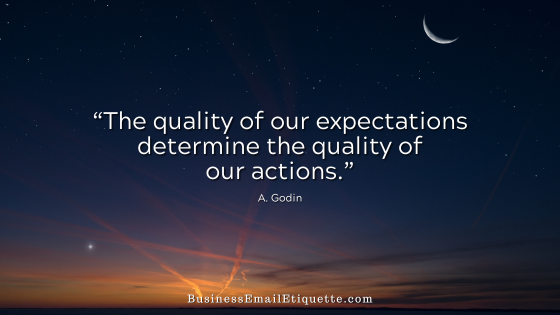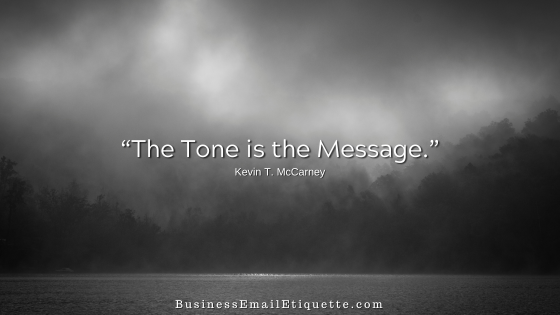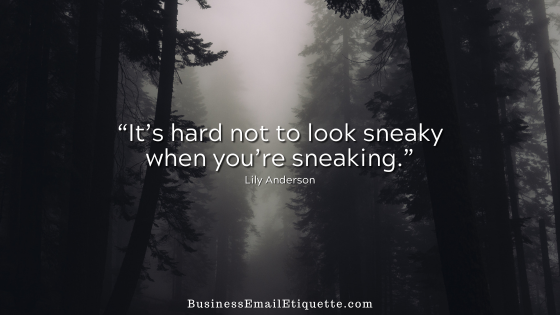Don’t Overreact Based on Assumptions

I often share my experiences with others online to illustrate how email can impact how you are perceived. Running this site and many others, I am probably more exposed than most, given the number of inquiries and personalities I encounter daily.
On all my websites, including this one, I have a form that visitors can use to ask me a question related to the site’s topic. For this site, questions are about Business Email Etiquette.
Since it is my website, and I take the time to answer visitor questions, common business courtesy would naturally lend to being respectful when I respond, even if the answer is not one that the inquirer might like.
Anyone who knows me will tell you I won’t sugarcoat the truth or change the reality of my answers based on whether someone will like my response or not. When you are a consultant and people ask you questions, you respond based on your knowledge and experience.
Ask Business Email Questions and I’ll Answer — Honestly
BusinessEmailEtiquette.com is a professional business site, so I expect a certain level of professionalism and decorum when I am asked for my input. At this point in history, who doesn’t realize the importance of business communications?
As is always the case, even for less-than-professional inquiries, I respond point by point, professionally and courteously, without regard for whether my response is expected or desired. I’m asked for my advice, and I provide it based on my decades of experience.
There are times when, if I do not respond as anticipated, certain online users become defensive and accusatory. To which I think they made the first move by asking for my advice, didn’t they?
Don’t Shoot the Messenger
For example, one emailer asked about setting up a specific type of marketing email on their server. This business owner also mentioned they would use email addresses found on websites for their marketing email activities.
First off, their inquiry wasn’t about Business Email Etiquette — the topic of this site. It was about server functionality concerning handling emails. Even though the question was not really on topic, I took the time to offer my suggestions, since I also happen to know how all that works.
I also added a cautionary comment to be careful of spamming, asking if they had permission to email these addresses. Of course, if they farmed them off websites, they most certainly did not.
They confirmed that they planned to send commercial emails to contacts who did not expressly or directly ask for information from them. I then commented on the dangers of doing so, as it is against the law. Credible businesses that want to gain new customers do not engage in spamming.
I continued that they risk getting complaints to their hosting and email providers. These complaints then can lead to being blacklisted. Not fun and credibility lost.
That’s when everything fell apart. How dare I assume they were spammers? (I didn’t; I just mentioned to be careful.)
The reality is that I work with clients every day who believe that publicly displayed email addresses give them carte blanche to create email lists to send business promotions to those who did not ask for their information.
Then came, “How can I sleep at night treating people this way?”
Wow — didn’t see that coming. I’m just trying to help — in my experience, I’ve had many a client who, when I pointed this out, did not know that was the case.
You Know What Happens When You Assume
I did not assume. I stressed a concern based on the information provided. So if you think about it, who is the one assuming here?
No one appreciates being replied to in an accusatory manner, especially when trying to offer advice based on the content of the inquiry. As for sleeping at night, I have no problem there.
As I always do, I tried to smooth things over kindly. An overreaction of this magnitude was not typical, nor was it based on anything I typed.
Assumptions were made, but at least on my side, without hostile intent. Having my character and experience being questioned using adjectives that true professionals never use.
Everyone who is online will encounter this situation at some point and, most likely, will be on both sides at one time or another, if they haven’t already. You mean well, but misunderstandings and assumptions contribute to the conversation going sideways.
The lessons to be learned?
Be Better Than That
If you are on the receiving end of an over-reactionary emailer, do your best to communicate with the clarity and kindness they were unable to offer you. However, if that doesn’t appease the inquirer, realize that some emails are just not worth taking your time to respond to.
Resorting to insults and innuendos on either side because someone was unclear, causing an innocent misunderstanding, or because the advice given is disliked, will only reflect poorly on your lack of professionalism and integrity.
And that is not good for business.







